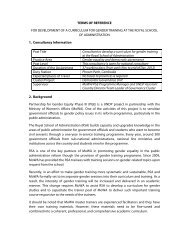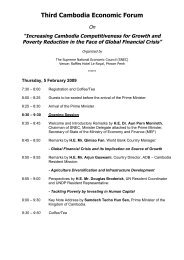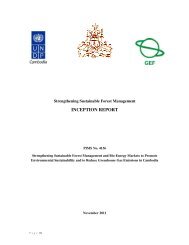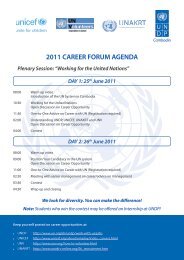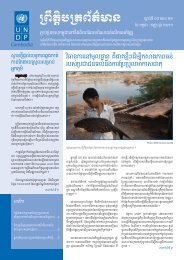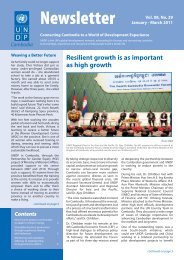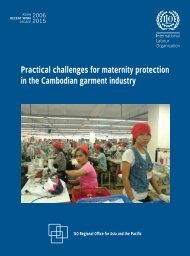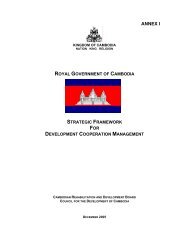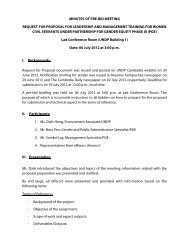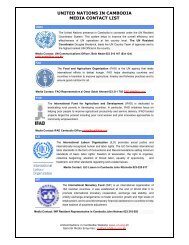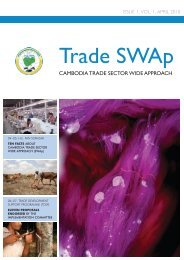UN Analysis Final.pdf - United Nations in Cambodia
UN Analysis Final.pdf - United Nations in Cambodia
UN Analysis Final.pdf - United Nations in Cambodia
Create successful ePaper yourself
Turn your PDF publications into a flip-book with our unique Google optimized e-Paper software.
explanation and clarification. Other key words are when, where, who, and what.<br />
When an <strong>in</strong>dividual tells someth<strong>in</strong>g about themselves, be alert for opportunities to ask the group if they<br />
have had a similar experience or made a similar observation or thought. And then ask the group if others<br />
<strong>in</strong> the village have had similar experiences or thoughts. It will be especially <strong>in</strong>terest<strong>in</strong>g and useful to ask<br />
young men and women to compare their situation or themselves with others <strong>in</strong> the community who<br />
they perceive to be better off or worse off.<br />
Sometimes it is useful to draw pictures or make diagrams – or ask participants to do so if you th<strong>in</strong>k it will<br />
help clarify a po<strong>in</strong>t or generate more discussion. (See the checklist of materials below, and be sure you<br />
have everyth<strong>in</strong>g!)<br />
Wrapp<strong>in</strong>g up the FGD. When you sense the group is tired and ready to stop, you will want to start<br />
wrapp<strong>in</strong>g up. As you get toward the end, be sure to let people know how much more time there is<br />
(“In the next ten m<strong>in</strong>utes before we stop, I would like to ask a few more questions….”) When you get<br />
to the end, be prepared to give the group a brief summary of what you have observed and learned, and<br />
ask if they agree. Be sure to thank everyone for his or her time – this is really important!<br />
After the FGD is over, the research team should sit together and make a list of the most important/<br />
<strong>in</strong>terest<strong>in</strong>g observations and po<strong>in</strong>ts that came up. Be sure to identify the po<strong>in</strong>ts that were surpris<strong>in</strong>g<br />
or controversial, and the themes that seemed to generate the most discussion. This is a useful exercise<br />
<strong>in</strong> terms of help<strong>in</strong>g you prepare the daily report as well as prepare for the next FGD.<br />
IV. CHECKLIST OF ISSUES AND METHODS FOR INDIVIDUAL INTERVIEWS<br />
Many of the issues and methods concern<strong>in</strong>g FGDs can be modified and adapted for both key <strong>in</strong>formant<br />
and <strong>in</strong>dividual <strong>in</strong>terviews. However, the <strong>in</strong>dividual <strong>in</strong>terviews should not require as much time, perhaps<br />
30-45 m<strong>in</strong>utes for the <strong>in</strong>dividual <strong>in</strong>terview with youth and up to one hour with the adult key <strong>in</strong>formant<br />
<strong>in</strong>terviews.<br />
As with FGDs, be prepared with all the material you need (<strong>in</strong>clud<strong>in</strong>g water and snacks to share with<br />
participants) and be ready to start on time.<br />
Before start<strong>in</strong>g, take a few m<strong>in</strong>utes to chat briefly with your prospective <strong>in</strong>terviewee to make sure he or<br />
she is a reliable <strong>in</strong>formant. In some cases, <strong>in</strong>formants may be distracted by work they are do<strong>in</strong>g or<br />
watch<strong>in</strong>g after children. In such cases, it may be better not to start the <strong>in</strong>terview and choose someone else.<br />
Also, be sure to make sure that the surround<strong>in</strong>g circumstances are conducive to a good <strong>in</strong>terview. If there<br />
is too much noise or other k<strong>in</strong>ds of environmental distractions, it may be best to conduct the <strong>in</strong>terview<br />
<strong>in</strong> another location. In the case of key <strong>in</strong>formant <strong>in</strong>terviews, it may actually help to have additional<br />
people observ<strong>in</strong>g so that <strong>in</strong>formation can be cross-checked and verified right on the spot. In the case<br />
<strong>in</strong>dividual <strong>in</strong>terviews, however, you may need to be careful about confidentiality and so may want to<br />
select a more private location.<br />
Gett<strong>in</strong>g discussion underway: start the <strong>in</strong>dividual <strong>in</strong>terview by do<strong>in</strong>g a simple personal life history<br />
exercise to help them talk about themselves. As for KIIs, you may want to make one or two observations<br />
about the village environment and ask the <strong>in</strong>terviewee to respond.<br />
136 Situation <strong>Analysis</strong> of Youth <strong>in</strong> <strong>Cambodia</strong>



